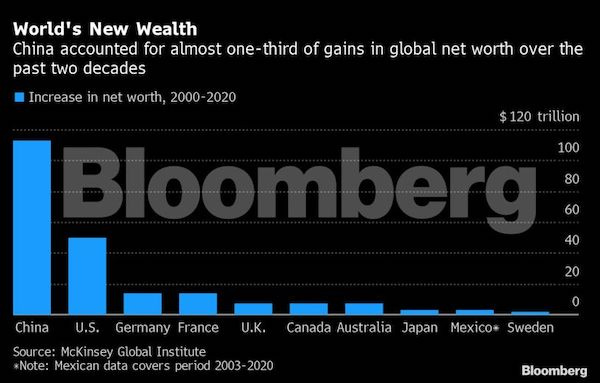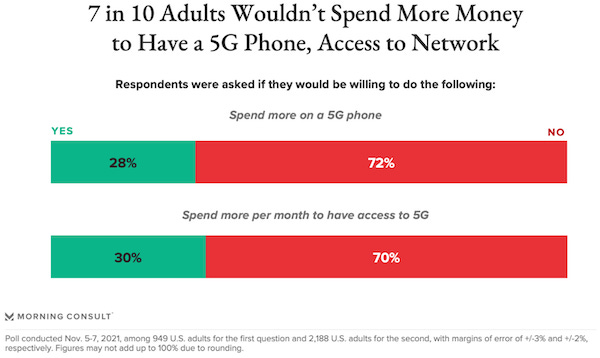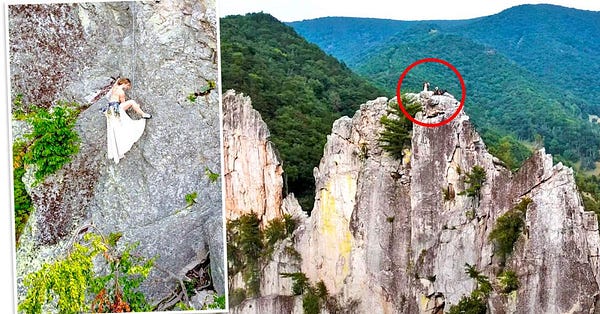5 days to subscribe: Starting Nov. 21, free subscribers will no longer get weekday newsletters like today’s edition (explanation here).
With the 40% Black Friday discount, the cost is $60 for year one.
Subscribers will get an email notice before the time of renewal, which would be at the regular annual price of $100 (BTW, there’s also a monthly option of $10/month).
Continued thanks for considering the subscription. Please reply to this email with any questions (or, just hit the red button!):
Today’s posts that caught my eye:
Global wealth tripled over the last two decades, with China leading the way and overtaking the U.S. for the top spot worldwide, McKinsey reports. In China and the U.S. — the world’s biggest economies — more than two-thirds of the wealth is held by the richest 10% of households, and their share has been increasing.
The Georgia General Assembly finalized new legislative maps, the Atlanta Journal Constitution reports. The GOP should hold 59% of seats in a state Biden won with 49.5%, cementing Republican majorities at the Georgia Capitol heading into next year’s elections.
So Russia tests an anti-satellite missile and it scatters hundreds of thousands of pieces of debris in low Earth orbit, forcing International Space Station’s seven crew members to take to their lifeboats? First, that sounds really scary. Second, who knew the ISS has lifeboats? after a cloud of space debris suddenly showed up on radars on a potential collision course with the $150 billion orbiting laboratory.
The World
U.S. President Joe Biden and Chinese leader Xi Jinping spoke of the need for cooperation in their first face-to-face summit, which went on longer than expected even though they announced no major breakthroughs. The video conference lasted for more than three hours, with the two leaders covering a range of topics including trade, the status of Taiwan and human rights. Xi agreed to create a “fast track” for U.S. executives to enter China. Biden, seated in the Roosevelt Room at the White House before two large screens, opened the discussion noting that the two have “spent an awful lot of time talking to each other” over the years, dating to when Biden was vice president and Xi was a rising power. “We need to establish some common-sense guardrails.” Xi, speaking next from a chamber in the Great Hall of the People in Beijing, also struck a conciliatory tone — referring to Biden as “old friend” — especially compared to a series of acerbic statements by Chinese officials over the course of the year. (Bloomberg, New York Times)
Here are the main fronts in the contest that is defining this era. (New York Times-2)
Dominance Around the Pacific: The U.S. has used its naval and air might to enforce order across the Pacific region since the end of World War II. This is not a state of affairs that China will accept for the long term.
Strength in Commerce: The trade war started by the Trump administration is technically on pause. But the Biden team has continued protesting China’s economic policies that led Trump to begin imposing tariffs on Chinese goods.
High-Tech Supremacy: Silicon Valley’s internet giants have mostly been shut out of China for years.
Human Rights and Freedoms: The Communist Party’s leaders have for decades bristled at outside criticisms of their authoritarian governance.
China’s nuclear build-up: ‘one of the largest shifts in geostrategic power ever.’ The US believes Beijing will quadruple its warhead arsenal by 2030. Military leaders in Washington face two critical questions. After decades of gradual increases in its nuclear forces, is China pivoting to a less defensive approach that has the potential to significantly alter the balance of power in East Asia? And could this enable China to win a conflict with the US over Taiwan by neutralizing the threat from American nuclear weapons? (Financial Times)
The EU agreed to impose new sanctions against Belarus that could extend to the country’s airlines and further hamper its economy — the latest escalation in a fight between European leaders and the authoritarian government in Minsk. The EU’s top diplomat said officials are still finalizing the scope and details of the sanctions, but countries have agreed to allow penalties to target airlines, travel agents and others who have transported migrants to Belarus. (Washington Post)
The U.S. State Department criticized Russia for “dangerous and irresponsible” behavior after an anti-satellite missile test scattered hundreds of thousands of pieces of debris in low Earth orbit, endangering the International Space Station and its crew. Mission controllers instructed the station’s seven crew members to take to their lifeboats after a cloud of space debris suddenly showed up on radars on a potential collision course with the $150 billion orbiting laboratory. (The Times)
The Biden administration is warning Americans in Ethiopia to evacuate immediately or risk being trapped if the civil war spreads to the capital. State Department spokesperson Ned Price said U.S. passport holders should not expect a Kabul-style airlift if the fighting reaches Ethiopia's capital, Addis Ababa. (Axios)
Pfizer shot generated most antibodies in comparative study. (Bloomberg)
New cases of the coronavirus caused by the Delta variant are now climbing in the Upper Midwest, Southwest, and parts of the Northeast of the U.S. ahead of the holidays, bringing a halt to the overall decline in cases that the country had been experiencing. (Wall Street Journal)
Minnesota has worst 7-day rate of new COVID cases in U.S. More than 95% of available inpatient hospital beds are filled, resulting in backups in emergency departments across Minnesota. (Minneapolis Star Tribune)
Schools embrace more Covid-19 testing over quarantine to keep kids in class. (Wall Street Journal)
Austria has imposed a new nationwide lockdown on people not fully vaccinated against the coronavirus or recently recovered from the disease. Those affected will be told to stay at home except for essential trips like for work or shopping. The decision is expected to impact some 2 million people from the population of 9 million. (Politico EU)
America is bracing for a sequel to the protests ignited after George Floyd's murder, with the focus now less on police and more on the nation's broader criminal justice system and self-defense laws. Activists and law enforcement officials warn that two ongoing national trials have the ingredients to reignite racial tensions and public protests when verdicts are handed down. In Kenosha, WI, Kyle Rittenhouse, 18, is charged with fatally shooting two men and injuring another during protests against police last summer. In the other case, three white men are on trial for killing Ahmaud Arbery, a 25-year-old Black man shot last year while jogging outside Brunswick, GA. In both cases, the accused are claiming self-defense. (Axios)
The Georgia General Assembly finalized new legislative maps with district boundaries drawn to ensure Republicans maintain control at the Capitol as Democrats gain ground in a changing state: The GOP should hold 59% of seats in a state Biden won with 49.5%. The completion of state redistricting cements Republican majorities at the Georgia Capitol heading into next year’s elections. (Atlanta Journal Constitution)
Beto O’Rourke enters 2022 a weaker candidate with a harder race: O’Rourke joins the 2022 gubernatorial race as Texas’ best-known Democrat, but he carries considerably more baggage after a series of political failures, including his bids for U.S. Senate and president. This time, instead of riding a blue wave nationally, he’ll be fighting a red one. (Texas Tribune)
Wyoming Republican leaders voted to no longer recognize Rep. Liz Cheney as a member of their party. The resolution, which does not strip Cheney of any tangible power, passed the Wyoming GOP Central Committee by a vote of 31-29. (Casper Tribune)
International enrollments tumble below one million for the first time in years: The number of international students at American colleges declined precipitously during the Covid-19 pandemic, with new enrollments tumbling 46 percent in fall 2020, a steeper decline than for any other student group. (Chronicle of Higher Ed)
Communities in western Canada who were forced to flee their homes this summer by wildfires and extreme heat are once again under evacuation orders after overwhelming floods across the region. The heavy rainfall and pounding storms are also taking a toll on the US Pacific north-west, where flooding and mudslides in Washington state have also forced evacuations and school closures. Helicopters were dispatched more than 60 miles east of Vancouver, to rescue about 275 people, including 50 children, who had been stranded on the road since it was blocked by a mudslide late on Sunday. (The Guardian)


Economy
Global wealth tripled over the last two decades, with China leading the way and overtaking the U.S. for the top spot worldwide. That’s one of the takeaways from a new report by the research arm of consultants McKinsey & Co. that examines the national balance sheets of ten countries representing more than 60% of world income. Net worth worldwide rose to $514 trillion in 2020, from $156 trillion in 2000, according to the study. China accounted for almost one-third of the increase. Its wealth skyrocketed to $120 trillion from a mere $7 trillion in 2000, the year before it joined the World Trade Organization, speeding its economic ascent. In China and the U.S. — the world’s biggest economies — more than two-thirds of the wealth is held by the richest 10% of households, and their share has been increasing, the report said. (Bloomberg)
Academic research and data show that as China’s economy matures, more of the best opportunities have been accruing to the children of wealthy and politically connected elites. Children from poorer or rural families are finding it harder to get ahead. One influential paper by scholars from the National University of Singapore and the Chinese University of Hong Kong found that children born into families at the bottom of Chinese society in the 1980s were less likely than those born in the 1970s to move up over time—what the authors called “an increasing intergenerational poverty trap.” (Wall Street Journal)
Gold prices have surged near their highest level in five months, a sign of growing unease that inflation will slow the economy and undercut the stock market’s steady run up. Most-actively traded gold futures inched down 0.1% Monday to $1,866.60 a troy ounce but stayed just below their highest point since mid-June. Prices broke out of a long rut last week, adding nearly 3% after data showing inflation surged at its highest annual pace in three decades in October. The haven metal’s sudden climb shows investors’ mounting anxiety that inflation will linger longer than Federal Reserve officials expect. (Wall Street Journal)
Elon Musk exercises options, sells $930 million of Tesla shares. (Bloomberg)
JPMorgan Chase filed a lawsuit against Tesla, accusing the electric car firm of "breach of contract action" over stock warrants following CEO Elon Musk's 2018 tweet that he might take his firm private. JPMorgan alleges the bank and Tesla "entered a series of warrant transactions, which required Tesla to deliver either shares of its stocks or cash to JPMorgan" if the car company's share price was above the contractual "strike price" when the warrants expired. (Axios)
Biden’s electric vehicle plans spark outrage in Mexico and Canada. U.S. trading partners insist that EV incentives breach terms of USMCA pact. (Financial Times)
Monthly premiums covering physician and outpatient care for Medicare beneficiaries will increase by 15% next year — one of the largest increases ever. CMS said the hike is mostly due to potential use of Biogen's Aduhelm, a drug for Alzheimer's disease that's drawn criticism for carrying a high price tag despite unclear effectiveness, along with ongoing uncertainty from the coronavirus pandemic. (Healthcare Dive)
Coinbase co-founder launches biggest VC fund in crypto: Paradigm’s new $2.5 billion venture fund bolsters the VC firm’s position as a leading contender. The fund plans to invest in crypto companies at all stages, particularly investments aimed at transforming finance and tech. The new fund from Paradigm surpasses the $2.2 billion crypto fund Andreessen Horowitz announced in June. Founded in 2018 by former Sequoia Capital partner Matt Huang and Coinbase co-founder Fred Ehrsam, Paradigm has made investments in some of the biggest names in crypto. (The Information)
The crypto capital of the world: It has to be somewhere. Why not Ukraine? In early September, the Parliament here passed a law legalizing and regulating Bitcoin, step one in an ambitious campaign to both mainstream the nation’s thriving trade in crypto and to rebrand the entire country. “The big idea is to become one of the top jurisdictions in the world for crypto companies,” said Alexander Bornyakov, deputy minister at the two-year old Ministry of Digital Transformation. (New York Times)
Technology
The private sector and federal government have begun the push for 6G broadband, but much of the public is still behind on 5G: At least 7 in 10 adults who don’t have a 5G phone said they would not be willing to pay more for one with those capabilities, while most of the public won’t pay more to access those networks every month. (Morning Consult)
Newsletter start-up Substack has reached 1m paying subscribers, underlining the growing power of à la carte journalism by individual writers as a business model for news. Substack offers writers a tech platform to self-publish and create their own freelance business, charging a fee for access to their newsletters. After print advertising collapsed with the rise of the internet, both news companies and individual writers began turning to subscriptions, selling their work directly to readers. (Financial Times)
Apple unveiled another beta program, but instead of offering early previews of software for your Mac, iPhone, or iPad, it’s a new initiative called Business Essentials. In line with Apple’s recent shift toward selling services, it’s a subscription package aimed at small businesses with three different plans and a move that has been anticipated since it acquired the device management platform Fleetsmith a little over a year ago. (The Verge)
Of all the ways Zoom Video Communications could squeeze more revenue out of its wildly popular videoconferencing service, the company’s founder and CEO Eric Yuan made it clear there was one thing he didn’t want to do: sell advertising. That was then. Earlier this month, Zoom announced that it would start showing web advertisements to users of a free tier of its service, which became a lifeline to millions of people during the pandemic who suddenly depended on it to connect with work, family and friends. But while that surge in usage made Zoom into a household name, it also brought with it soaring costs for running the technical underpinnings of the videoconferencing service. While Zoom doesn’t disclose how much it pays to support the free version of its service, a person who works at Zoom said the tab is well over $100 million a year. (The Information)
Apple unveiled another beta program, but instead of offering early previews of software for your Mac, iPhone, or iPad, it’s a new initiative called Business Essentials. In line with Apple’s recent shift toward selling services, it’s a subscription package aimed at small businesses with three different plans and a move that has been anticipated since it acquired the device management platform Fleetsmith a little over a year ago. (The Verge)
Smart Links
Biden signs $1 trillion infrastructure bill into law. (Reuters)
The Glasgow climate pact, annotated. (Washington Post)
At White House, frustration over who gets to ask questions. (The Hill)
Global dividends poised to top pre-pandemic levels by end of 2021. (Financial Times)
The consulting firm billionaires turn to when they give away money. (New York Times)
MBA programs have record high female enrollment this year—but it’s still only 41%. (Fortune)
China’s burned-out tech workers are fighting back against long hours. (MIT Technology Review)
Beanie Babies airlifted from Chinese factories to O’Hare to circumvent shipping backlogs in time for the holidays. (Chicago Tribune)
Harvard Crimson elects first Latina president in student newspaper’s nearly 150-year history. (Washington Post, Harvard Crimson)
Good News
Billionaire Robert F. Smith gifts thousands of shares of stock to help Black and Latinx kids become shareholders. (Yahoo! News)

Here climbs the bride . . . at 900 feet. With her marriage blessed atop a 900ft shard in West Virginia, Dawn LeBlond felt as if years of struggle were falling away. (The Times)
5 days to subscribe: Starting Nov. 21, free subscribers will no longer get weekday newsletters like today’s edition. Click the red “Subscribe” button to see pricing options.






